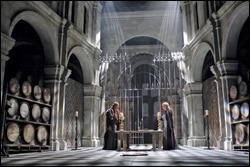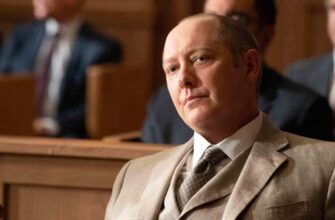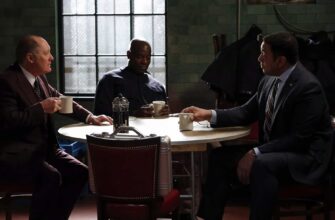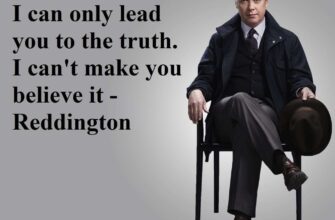Warning: Spoiler Alert
NOTE: Assuming that Mad Men answered its definitive question in its final episode, the previously-intended headline was “Who Don Draper Is.” And while the conclusion definitely provided a strong hint, it was not a definitive statement.
Out of all of the trademark shows of TV’s New Golden Era, Mad Men may be the most unlikely. Sure, it’s wrapped in the glamorous coating of the advertising business at the time when it was becoming truly ascendant in modern society and it covers one of the three or four most divisive/colorful/consequential decades in American history, but at heart it’s about the existential journey of one troubled man. That’s unlikely territory for a pop culture phenomenon.
The question “Who is Don Draper?” from an episode near the midpoint of the series (actually, the opening line of Season 4) has always been right near the surface and the answer has seemed, at times, frustratingly inconsistent. He’s a man who cares about maintaining a marriage to Betty – and later Megan – until he doesn’t. He’s a man who, although softer than Betty, keeps an emotional distance from his children – missing birthday parties and confessing to Megan about the children evoking numbness instead of love from him – until he realizes that he loves them (although he continues to make grave mistakes). He’s a man who values his standing as one of the most respected creative minds on Madison Avenue – until he doesn’t, throwing away his career more than once. And he’s a man who maintains good relationships in his professional orbit – until he doesn’t, disappointing others with bursts of selfishness, ego and unilateralism.
Just as the other show that helped put AMC on the map for prestige dramas (Breaking Bad) did, Mad Men preceded its series finale with a marathon that lasted several days, taking viewers through the journey of Don Draper and the world around him one last time. For Breaking Bad, the marathon served to remind everyone of the signature moments in the transformation of Walter White into Heisenberg. While it might have highlighted some moments that would prove significant in the end, viewing the marathon didn’t serve much of a purpose beyond entertainment, because the stakes were clear and there was little of a revelatory nature in this re-airing.
But the chance to revisit Mad Men in this format actually proved useful in terms of tracing the journey that Matthew Weiner intended the viewers to witness. Dick Whitman was wearing the skin of another man, the “real Don Draper,” peddling the alternate reality of high-level advertising. His quest for authenticity in his life has been omnipresent, even when it seemed otherwise. The writing of Don may have seemed inconsistent in terms of his happiness when solving his problems (many of them self-created), but the lesson learned when approaching the finale with a revisiting of the full history is that previously, Don was never to be believed when he professed joy at turning a certain corner. Even on the rare occasions when he was attacking a single root cause – such as the trauma in his childhood in the whorehouse at the end of Season 6 – by not stripping his life down to the core and re-examining everything from there, he was papering over the other issues that shaped him so profoundly. From this perspective, it seemed clear that Don’s search for real life answers was incongruent with a life in advertising, which taught him that the secret to success was cynicism. Think back to the pilot, when Don boasted “What you call love was invented by guys like me to sell nylons.” Surely, Don was never going to find his elusive authenticity in that business – or so we’ve thought. Your perspective on that issue alone will be enough to shape your interpretation of the finale’s conclusion.
As such, Don’s extended road trip through the stretch run of the show almost seems inevitable in retrospect considering his previous experiences. He had to get out of that Greater New York bubble, away from all friends and family, to learn about what direction his life should take.
Rarely does a finale benefit from the showrunner ruling out a certain path, but Weiner stating last week that Don does not become DB Cooper is one such instance. Sure, creating an iconic television series that ends with the lead character shockingly becoming America’s most mysterious legendary criminal would be very clever. But it would really betray the soul of the show, especially in the aftermath of the death sentence that Betty received from her doctor. While Don’s children seemed to be doing just fine without him before he left, circumstances have changed in a way that would render his desertion – the second one of huge magnitude in his life – as the furthest note possible from a feel-good ending.
Let’s put a pin in the subject of Don, however, since Weiner made the fan-pleasing decision to feature a large part of his cast in the finale, even characters that could have plausibly been considered to already have closure. For example, Ken pops up at lunch with Joan to try to recruit her to help him obtain better-quality industrial films for Dow. Before you know it, old Joanie’s looking at coming out of retirement to start a small production company and she tries to bring Peggy on board as a partner and the chief writer. While Peggy – a bit frustrated with some matters at McCann already – considers the offer, the show’s signature redhead deals with the two older men in her life. Roger, who has decided to marry crazy Marie after a wicked fight, wants to put Kevin in his will and Joan accepts after some consideration. And adventurous retiree Richard (who shared a toot with her near the top of the episode) is none-too-pleased with Joan being tied down to New York by her new company and he dumps her. Peggy declines the job, but for all of the turmoil involved in the situation, Joan seems to be doing just fine in the end.
For Peggy, a number of factors play into her staying at McCann. A departing Pete tells her that he is certain that she’ll be the creative director at the mammoth company by 1980 (which she considers to be a long way off!) and Stan wonders if the allure of becoming her own boss rather than accumulating power in the big firm might be based on ego. This leads to a vicious fight between them and the wounds are still fresh when she talks to Rizzo coming off of Don’s “goodbye” call from California – much more about that below. When she apologizes for her earlier tirade and indicates that she’s staying, a relieved Stan comes clean with the reality that he is in love with her. Peggy is stunned, but as she talks through her feelings, she realizes that she feels the same way. Keep in mind that this entire conversation is taking place over the phone in the office and they aren’t in the same room until Stan comes down to her office and they kiss at the end of the scene.
Back to Don, who never physically appears back in New York during the episode, although his final moments surely tell the tale of where he lands. At the outset, on the surface, he’s living the free and easy life of a “retiree” from the ad business (as the 45-year old man laughably calls himself), testing rocket cars in the desert and consorting with women of ill repute, but it’s clear that he remains enmeshed in a downward spiral. It’s interesting that his road trip had been previously pointing in the direction of him re-embracing his Whitmanesque qualities, but the boozing and womanizing point more in the direction of his Draper life – with the accompanying self-hatred that underlies all of his breakdowns.
During a phone conversation with Sally, she predictably informs him of Betty’s fate and he resolves to come home and take full custody of the children upon her passing, but her disagreement and another phone call with Betty convinces him otherwise. Her final wishes, she informs him, involve her brother and sister-in-law handling the primary raising of the children with Don continuing in a secondary role. He is crushed, but understands her point of view. Meanwhile, his children are having to grow up faster than he wanted, with Sally deferring her European trip and Bobby telling her that he’s overheard everything about Betty’s grim news.
Still grasping for some authentic connection in his life, Don looks up Anna Draper’s niece Stephanie. She takes him to some kind of hippie self-help commune/seminar series, where she admits to her lack of interest in reclaiming her baby from his grandparents. This creates much emotion in the room and when Don later tries to comfort her, she throws his role-playing as “Don Draper” back in his face. She’s right, he’s not really her uncle, but he cares nonetheless and he is shaken that his advice about putting the matter behind her – previously delivered to Peggy on the exact same subject with much greater effectiveness – is so effortlessly rejected by her. When she has vanished the next morning – leaving him stranded in a remote area without a ride – the reality of his present circumstances bears down on him with full force. First his young daughter Sally and now screwed-up Stephanie are seemingly showing more of a grasp on adulthood than he ever has. This is absolute rock bottom.
Feeling resigned to his fate, he calls Peggy to apologize for not saying goodbye when he left and to try to achieve some closure with her. She starts by chewing him out for running away again, scaring people as he is wont to do (and, although she doesn’t mention it, costing poor Meredith her job without having Don to employ her anymore – although perhaps that development proves reversible in the end). Don states that he has a lot more to feel badly about than that, confessing to having screwed up everything in life, including stealing a man’s identity and making nothing of the chance. He declares that he’s not the man that she thinks that he is. Peggy is puzzled by many of these statements, although troubled by Don’s state of mind and she tells him that it’s not too late to turn everything around. Even his job can be salvaged, as apparently McCann has forgiven worse than this. Don doesn’t want to delve further into matters, having completed his mission of trying to make good with his star protégé and he ends the conversation. Seeing his pain, a woman asks him to accompany her to one of the remaining seminars.
In the final segment, amidst a montage of wider final developments – Pete and Trudy getting on a Learjet, Joan answering a new work phone line at home, Roger and Marie cavorting on what appears to be their honeymoon, Betty smoking (!!!) morosely at home as she waits for the cancer to finish her and Stan approaching Peggy in the office to kiss her – Don remains at the commune and he is moved by the words of Leonard, a man living an average existence and feeling invisible to and isolated from all who are around him. In short, this man is the exact opposite of the Don Draper who has commanded every room for seven seasons, but they are bonded in that moment by the pain of their self-induced loneliness. A crying Don embraces the man as we are left to wonder what it all means in the final moments of the final show.
The build to the finish of the program was one of the stranger ones for any epic show on television, because leaving Don amidst the self-help folks at the very end would have been a conclusion even stranger and more random than the legendary Sopranos one that Weiner helped to craft. [Side note: the nature of the self-help hippie gaga that Don was immersed in is actually more commonly associated with the mid-‘70s than 1970 itself, but California is usually ahead of most trends, so it’s possible that the setting was not unrealistic.] The final scene of Don shows him as part of a group meditation doing the “Ommmmmmmmmmm” chant along with everyone else, but the tiniest, barest hint of a Cheshire grin grips his face … as the final scene pops up, the iconic “I’d Like to Buy the World a Coke” ad from 1971. Of course, that campaign was created by none other than McCann Erickson!
So the crystal-clear inference is that Don Draper, having spent the past three episodes fully marinating in the juices of his inner Dick Whitman, found a way to get back into the good graces of McCann while presumably maintaining his rediscovered true values. With the real-life McCann having been responsible for other big-time successes in the 1970s, such as the previously-teased Miller Lite launch, the stage has long been set for this fictional character to be assumed responsible for so many huge productions yet to come. And yet, his cross-country wanderings in the endgame seemed certain to preclude this course.
Still, the ending was enigmatic, but that word is practically a signature for the Weiner style. Because the last few episodes had been spent establishing the advertising business as antithetical to the authenticity that Don needed so desperately, the Coke campaign could have been crafted by the mind of a man who backslid into his old patterns and would spend the 1970s and beyond as the same inconsistent presence to those around him that he always had been. Perhaps Weiner himself will feel compelled to shed additional light on his vision – which his Sopranos boss David Chase has always been loath to do about his final fade-to-black – but until then, the bet in this corner is that Don was meant to be seen as someone who had finally figured out how to balance being a great creative presence with his very human Dick Whitman qualities. Otherwise, if he merely figured out how to leverage the pain of Leonard and others who shared his suffering into big money through a phony “togetherness” ad campaign, then he is revealed as a truly repugnant person.
Additionally, and this won’t necessarily go down as one of the bigger swerves of the finale, McCann Erickson proved to be a more durable home for the old Sterling Cooper crew than previously anticipated with Don almost certainly rejoining old partners Roger and Ted, as well as Harry, Stan and the sticking-around Peggy. Nevertheless, the impetus of Sterling Cooper being swallowed up – as well as Betty’s shocking health news – drove the action of the last half of the half-season in grand style. It’s difficult to compare Mad Men’s ride on an apples-to-apples basis with those of a more transparent nature, such as Justified, Breaking Bad or The Shield. Every one of those shows was barreling down a pretty clear path. Don’s story could have ended in so many different ways without Weiner seeming to have betrayed his vision. In the end, the path he chose was a satisfying one that seemed to leave everyone involved with a logical start to their “post-show canon” lives. More so than most of the aforementioned programs, you’re left with a sense of wanting to know the alternative ideas that were batted around, because it’s possible that some of them could have been better (although it’s probable that many would have been worse). But in the end, this final episode worked and any praise beyond that would be superfluous. Good job, Matthew Weiner.







